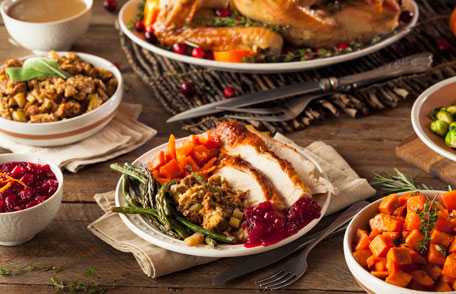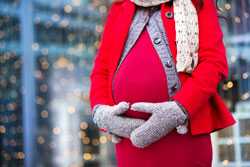Food Safety Tips for the Holidays
 Feasting with family and friends is part of many holiday celebrations. Follow these simple tips to keep safe from food poisoning, or foodborne illness, during the holidays.
Feasting with family and friends is part of many holiday celebrations. Follow these simple tips to keep safe from food poisoning, or foodborne illness, during the holidays.
Everyone can practice food safety during the holidays
- Wash your hands. Be sure to wash your hands with soap and water before and after preparing food, after touching raw meat, raw eggs, or unwashed vegetables, and before eating or drinking.
- Cook food thoroughly. Meat, poultry, seafood, and eggs can carry germs that cause food poisoning. Use a food thermometer to ensure these foods have been cooked to the safe minimum internal temperature. Roasts, chops, steaks and fresh ham should rest for 3 minutes after removing from the oven or grill.
- Keep food out of the “danger zone.” Bacteria can grow rapidly at room temperature. After food is cooked, keep hot food hot and cold food cold. Refrigerate or freeze any perishable food within 2 hours. The temperature in your refrigerator should be set at or below 40°F and the freezer at or below 0°F.
- Use pasteurized eggs for dishes containing raw eggs. Salmonella and other harmful germs can live on both the outside and inside of normal-looking eggs. Many holiday favorites contain raw eggs, including eggnog, tiramisu, hollandaise sauce, and Caesar dressing. Always use pasteurized eggs when making these and other foods made with raw eggs.
- Do not eat dough or batter. Dough and batter made with flour or eggs can contain harmful germs, such as E. coli and Salmonella. Do not taste or eat unpasteurized dough or batter of any kind, including those for cookies, cakes, pies, biscuits, pancakes, tortillas, pizza, or crafts. Do not let children taste raw dough or batter or play with dough at home or in restaurants.
- Keep foods separated. Keep meat, poultry, seafood, and eggs separate from all other foods at the grocery and in the refrigerator. Prevent juices from meat, poultry, and seafood from dripping or leaking onto other foods by keeping them in containers or sealed plastic bags. Store eggs in their original carton in the main compartment of the refrigerator.
- Safely thaw your turkey. Thaw turkey in the refrigerator, in a sink of cold water that is changed every 30 minutes, or in the microwave. Avoid thawing foods on the counter. A turkey must thaw at a safe temperature to prevent harmful germs from growing rapidly.

Pregnant women are 10 times more likely than others to get listeriosis, a rare but deadly foodborne infection caused by the bacteria Listeria.
Pregnancy and Food
While everyone wants to keep food safe during the holidays, it is especially important for pregnant women to do so because they are at increased risk of food poisoning.
- Avoid raw or unpasteurized milk and products made with it, such as soft cheeses. Raw or unpasteurized milk and products made with it can contain harmful germs, including Listeria. Avoid drinking raw milk and eating soft cheeses, such as queso fresco [2 MB], Brie, Camembert, feta, goat cheese, or Roquefort, if they are made from raw or unpasteurized milk. Do not eat or drink other raw or unpasteurized products, such as juice or cider.
- Be careful with seafood. Do not eat refrigerated smoked seafood unless it is in a cooked dish, such as a casserole, or unless it is canned or shelf-stable.
- Be aware of holiday beverages. To reduce the possibility of fetal alcohol syndrome, watch out for alcohol-containing holiday punches and eggnogs. Avoid eggnog entirely unless you know it contains no alcohol and is pasteurized or made with pasteurized eggs and milk.
More Information
More Information
- Find out more about food poisoning and how you can prevent it.
- Learn about the four steps to food safety – clean, separate, cook, and chill.
- See how you can keep food safe during the winter holidays.
- Get tips to help you have a safe holiday party.
- Take the guesswork out of preparing your holiday turkey with these tips.
- Get food safety information tailored for pregnant women.
- Page last reviewed: November 28, 2016
- Page last updated: November 28, 2016
- Content source:
- National Center for Emerging and Zoonotic Infectious Diseases
- Page maintained by: Office of the Associate Director for Communication, Digital Media Branch, Division of Public Affairs




 ShareCompartir
ShareCompartir